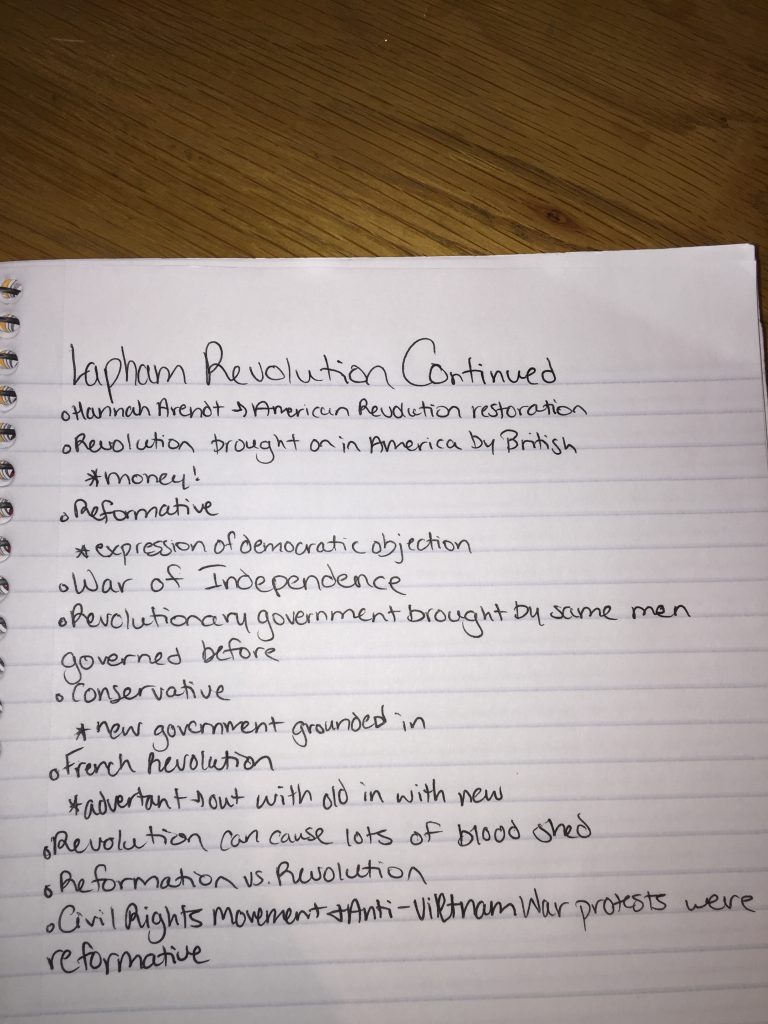To me, revolution means when people change. There are numerous ways for people to change, whether it be politically, socially, conceptuality, etc. That is why there are so many different “types” of revolutions, for example the American Revolution, the Environmental Revolution, and the Scientific Revolution. A revolution is when people change as an entity towards a new chapter. Also, I believe there are no boundaries of the impact a revolution needs to have, there simply has to be a level of reform. An individual could even have a personal revolution in which they change something within themselves.
Throughout this semester, we have talked about revolutions through numerous perspectives. In unit one, we analyzed Diderot’s Natural Rights and how a universal law created a foundation for a basic human society. His revelation challenged numerous governments in power, like the French legislation. Diderot created a change that would affect society forever, he himself caused an ongoing revolution of natural human rights. Unit two was extremely science heavy, with the common discussion on paradigm shifts. Paradigm shifts change basic concepts in relation to the scientific field. Therefore, a scientific revolution is made up of numerous paradigms shifts. A paradigm shift, without a revolution following, will typically shift back to what it was before. Revolutions can naturally occur, which was also discussed in unit two in relation to astronomy. Unit three was heavily surrounded by the tragic Rwanda Genocide. The totalitarianism of this country was the cause of the genocide, which was unusual since it did not result in any revolution. The country of Rwanda had no major change and no other country in the world helped the individuals of the genocide either. Unit four focused on the Civil Rights movement in the United States. Throughout the unit, we learned of all the horrors of the movement and then discussed what the effects of the movement were into society from then to now. Personally, I believe the Civil Rights movement was the start of a revolution but is a revolution we are still fighting today. There were major accomplishes that came from the movement but there are still racial issues that we still face as a society today. The revolution was started but is nowhere close to being finished.
Over fall break, I read Lapham’s Quarterly. Within this book, Lapham discussed revolution through various lenses and deliberated whether or not a revolution was natural or unnatural. Personally, I believe a revolution is unnatural because it requires a physical person to spark the change. Revolutions do not happen on their own but are the result of something or someone else. Revolutions break societal norms and require effort to make happen. Within his book, Lapham included images of objects he considers to be revolutionary. I had never thought about something as being a tangible example of a revolution. For example, Lapham considered the guillotine to be a revolutionary device due to the manner it was used in. However, after reading the book I understood the perspective Lapham was displaying in his work.
Overall, revolutions do not happen on their own, they require an individual or concept to spark them and fight for them to become a part of society and make a real change in the world.


Lapham, Lewis. Lapham’s Quarterly, Volume VIII, Number 2 (Spring 2014). Revolutions. New York: America Agora Foundation, 2014.